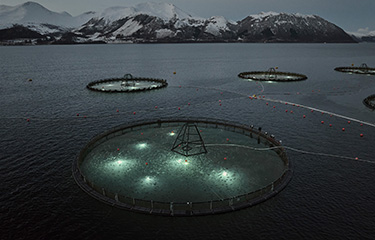LuxCod project announces cod farming breakthrough

A collaboration between researchers at Norwegian research institute Møreforsking and cod-farming company Ode has achieved what they are calling a scientific breakthrough in cod farming.
The research, dubbed the LuxCod project, investigated how light regimes impact cod in aquaculture settings. According to a release from Ode, the research discovered that correctly using lights on a cod farm can delay early maturation beyond the production period.
“This is an important breakthrough for the entire cod farming community and proves our potential to grow to a large share of the seafood category,” Ode CEO and Founder Ola Kvalheim said in a release. “It has been important to document these findings through scientific studies.”
The scientific study found that light management will significantly delay the sexual maturation in farmed cod, enabling a farmer to completely delay sexual maturation until the fish reach full harvest size. The study sampled fish throughout the production process, and the study produced cod with an average weight of up to five kilograms after 21 months of production without the fish becoming sexually mature.
“The findings demonstrate that the correct use of light management enables control of sexual maturation in cod,” Ode said in a release. “This valuable knowledge has the potential to significantly improve the aquaculture industry, ensuring enhanced fish welfare, high-quality products, and low ecological risks in open-pen farming.”
Sexually mature pose problems for cod farmers, as current regulations in Norway – where the majority of cod farms are being developed – require any farmer to harvest cod before they reach sexual maturity. In the event the Norway Directorate of Fisheries discovers sexually mature cod at an aquaculture facility, it will order the fish culled – something Norwegian cod farmer Norcod was forced to do in March 2023.
Culling fish before they reach the desired harvest size results in financial losses, but the new lighting regime will help reduce those risks, according to the study.
“This technique ensures that fish do not reach sexual maturation in the pens, allowing for optimal production while avoiding genetic influences and ecological concerns,” Ode said.
Photo courtesy of Ode






Share